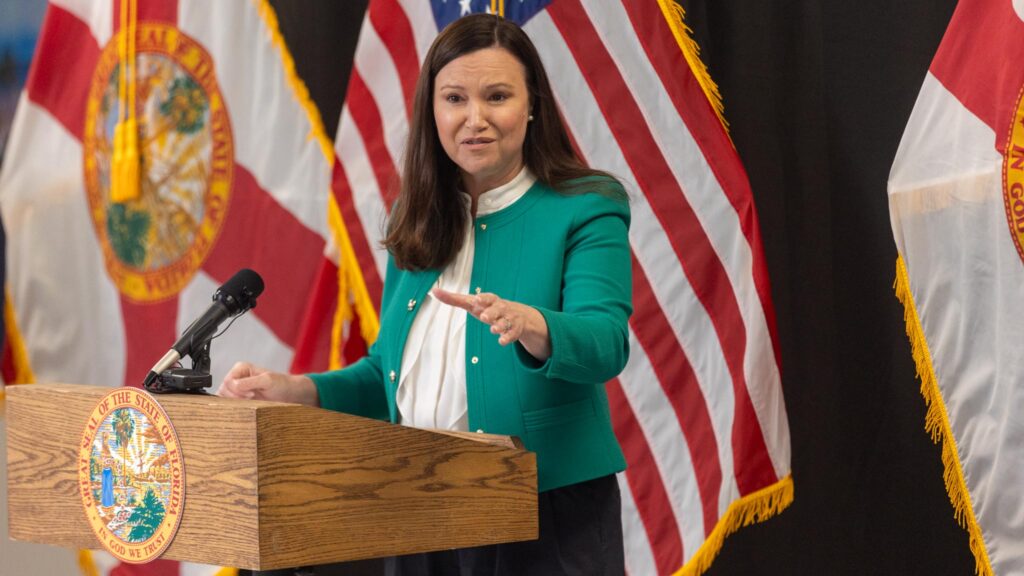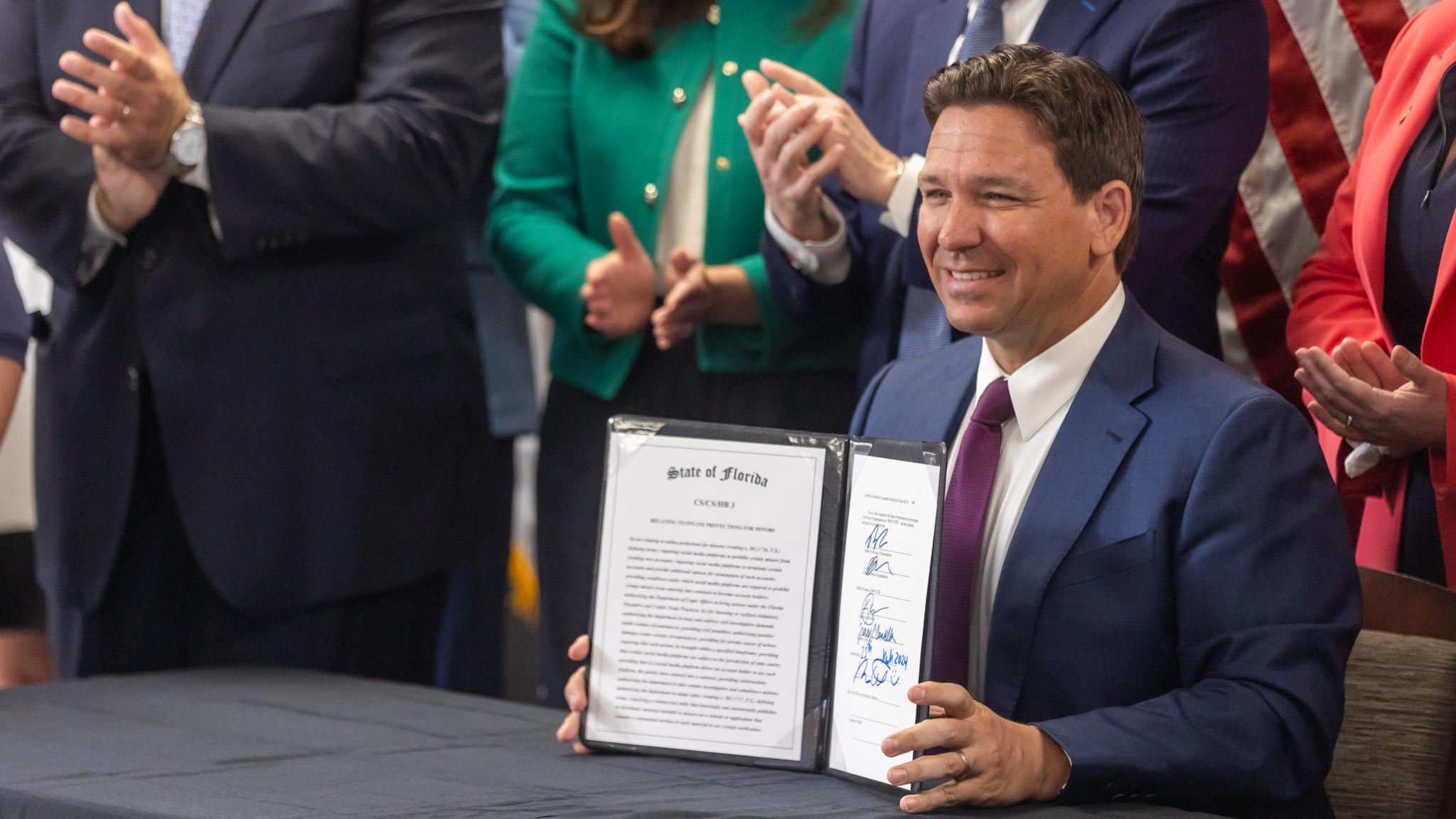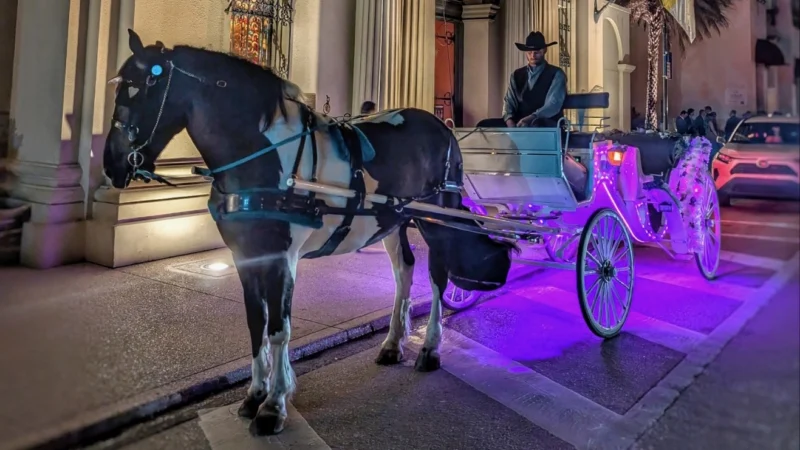Gov. Ron DeSantis came to a classical school in Jacksonville’s Sandalwood community Monday to sign a bill that outlaws social media use for nearly 3.5 million Florida children.
Under HB3, children under 14 will not be allowed to have social media accounts starting Jan. 1. Accounts will be terminated for those who already have them. Children who are 14 and 15 years old can have social media profiles only with parental permission.
DeSantis touted his background as the father of three children under 10 as part of the reason he signed the bill.
“Now, with social media and all this, you can have a kid in the house, safe — seemingly — and you have predators who can get right in there into your home,” DeSantis said during his appearance at Cornerstone Classical Academy. “You could be doing everything right, but they know how to manipulate these different platforms.”
HB3, a priority of House Speaker Paul Renner, R-Palm Coast, received overwhelming bipartisan support in both branches of the Florida Legislature. It passed 109-4 in the Florida House and 30-5 in the Florida Senate.
Rep. Angie Nixon, D-Jacksonville, was the only member of Northeast Florida’s delegation who did not support the bill. (Rep. Kim Daniels, D-Jacksonville, missed the vote). Nixon is a mother of five who says the state cannot selectively support the idea of parental rights.
“I believe it’s government overreach,” Nixon said. “As a parent, I should be able to determine if my children are allowed to be online. I should have parental rights. It’s a violation of the First Amendment. It’s not right. I’m really tired of the governor using our hard-earned tax dollars to have to fight in court for things that are unconstitutional.”
DeSantis acknowledged that the state expects a court challenge after Monday’s signing.
The industry group NetChoice this month urged DeSantis to veto the measure, arguing it would violate First Amendment rights. Spokeswoman Krista Chavez said in an email Monday that the group does not publicly discuss legal strategy, but it quickly recirculated earlier statements about the constitutionality of the bill.
“An unconstitutional law will protect exactly zero Floridians,” Carl Szabo, NetChoice’s vice president and general counsel, said in a statement. “HB 3 is also bad policy because of the data collection on Floridians by online services it will in effect require. This will put their private data at risk of breach.”
If the tech industry files a lawsuit, it would be the second major court fight against Florida’s social media laws in recent years.
NetChoice and another industry group, the Computer & Communications Industry Association, challenged the constitutionality of a 2021 Florida law that placed restrictions on large social media companies, such as preventing the platforms from banning political candidates from their sites and requiring companies to publish — and apply consistently — standards about issues such as banning users or blocking their content.
Federal courts have blocked much of that law on First Amendment grounds. Florida took the case to the U.S. Supreme Court, which heard arguments last month but has not issued a ruling.
Florida Attorney General Ashley Moody referenced the 2021 law during remarks Monday. She said social media companies create algorithms that are specifically designed to addict people.

“This is a piece of legislation that I truly believe is a model for the rest of the nation,” Moody said. “If we cannot protect our children in this digital frontier of the wild, wild west, there is no way with their maturity level and inexperience in life that they ever will be able to protect themselves.”
Duval County School Board member April Carney also invoked her children as she spoke from the dais in support of the bill. She also announced that she will look to ban cellphone usage in Duval County Public Schools.
Last spring, Carney said she visited the Internet Crimes Against Children division of the Jacksonville Sheriff’s Office. She thought she was vigilant about her children’s access to the internet before visiting. “I became more vigilant after,” she said.
Under HB3, parents and guardians of children under 14 could “request that the minor’s account be terminated” within 10 days of the request. The bill also requires age verification for those 18 and older in an effort to prevent minors from accessing potentially harmful material.
DeSantis vetoed an earlier version of the bill after raising concerns about constitutional issues and infringement on parental rights. But he negotiated with Renner on the plan that was signed Monday.
The earlier version would have directed age verification requirements for platforms. Those requirements would have affected adults creating accounts.
But the revamped plan does not include the requirements. As an alternative, supporters hope to ensure compliance by opening social media platforms to lawsuits for violations of the age restrictions. That would include lawsuits filed by the attorney general and lawsuits filed on behalf of minors.
Although the bill does not identify social media platforms that would be affected, it includes a definition of such platforms, with criteria related to such things as algorithms, “addictive features” and allowing users to view the content or activities of other users.
Monday’s signing drew students from the school as well as multiple Duval County School Board candidates and members of parental rights organizations.
Tia Bess is the director of national engagement for Moms For Liberty — a conservative parental rights organization — and the mother of three school-aged children in Clay County. She said she understands there is some pushback against the law, but she argued that the safety of children outweighs those concerns.
“There are some parents who say it should ultimately be our choice,” Bess said. “But, when you have mental health issues and all the problems we are facing right now due to social media, it’s time that we make policies to help our kids.”
Information from the News Service of Florida was used in this report.








